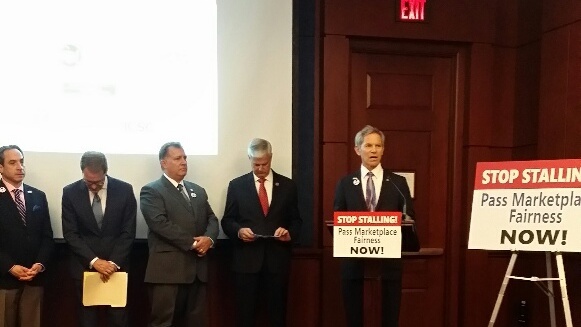
On Wednesday, December 3, as Congress returned to Washington for a brief “lame duck” session, ICMA, the “Big 7” organizations representing state and local government, and representatives of private sector retailers came together to encourage legislators to pass the Marketplace Fairness Act (MFA). The MFA was passed by the Senate last year with broad bipartisan support, but has stalled due to inaction by the House of Representatives. Any bills not passed by the end of the year will expire and have to be reintroduced in the new legislative session which begins in January 2015.
The Marketplace Fairness Act would level the playing field by closing a sales tax loophole that has left local “brick and mortar” retailers at a competitive disadvantage for nearly two decades. By authorizing states to require that remote vendors collect sales taxes, the MFA would enable local stores and online retailers to operate under the same rules. The marketplace would ensure that all retailers – whether online or offline – are competing on equal footing and would allow state and local governments to collect already-owed sales taxes, regardless of whether a purchase is made physically in a store, on the phone, or online.
Ralph Becker, mayor of Salt Lake City, Utah, and president of the National League of Cities, began the event by recognizing the legislation’s champions: Senators Lamar Alexander, Richard Durbin, Heidi Heitkamp, and Mike Enzi, as well as Arkansas Congressman Steve Womak. He noted that the MFA is widely considered a sensible solution that will put Main Street and online retailers on a level playing field. Said Mayor Becker, “Our local businesses are the heart and soul of our community and they need an equal opportunity to compete. Today there’s no excuse for Congress [not] to take action….They should do their job and act now.”
Congressman Womak continued by debunking the myth that the legislation would impose a new tax. “This is not a law that Congress is passing for a new tax,” he said. “This is a tax that has been on the books for a long time.” The bill simply updates our tax collection system to reflect the steady growth of online sales. Currently, online merchants are only required to collect sales tax if they have a physical presence in the consumer’s state. This loophole has given them a significant advantage as they are able to undercut prices by 5 to 10 percent, a margin with which brick and mortar retailers cannot realistically compete.
The bill aims to collect a tax that is already owed. Most states require consumers to report their online purchases on their tax returns and remit the appropriate sales tax; however, states have no reasonable or efficient enforcement mechanism to compel consumers to comply. The MFA would address this issue and allow states, cities, and counties to collect the approximately $26 billion in sales tax revenue from online transactions which currently remains uncollected.
Many opponents argue that the MFA will place an excessive burden on online retailers, who would be required to navigate the different tax rates in localities across the country. In response, the coalition explained that the bill will require states to provide free computer software that would streamline the collection process by helping retailers calculate the sales tax on each purchase, much like the online systems online now used to determine shipping costs based on zip code. This legislation would, in effect, be a tax simplification bill. Additionally, due to the exemption for small businesses that have less than $1 million in sales, only 3 percent of companies conducting business online will be affected
Commissioner Scott Dacy of Craven County, North Carolina, underscored the critical impact of uncollected sales tax revenue on communities: “Twenty-one percent of Craven County’s revenue comes from sales taxes.” State and local governments rely on sales tax revenue to fund programs and services that affect the quality of life for residents – fire protection, emergency services, law enforcement, parks and recreation, and economic development. Online businesses also benefit from public services such as transportation networks and infrastructure. The lost revenue from remote sales transactions shifts the tax burden from the larger population to a smaller group, hitting property owners especially hard as state and local governments look for other ways to raise needed revenue.
Senator Mike Enzi stressed the importance of local retail for the local communities. “I’ve been a retailer and I know what it means when a community goes dark. Retail communities are the heart and soul of our capacity… to develop a quality of life where people actually want to live.” National Governors Association Executive Director Dan Crippen added that “Congress should not be in the business of picking winners and losers. Doing nothing gives the out-of-state seller a leg up on the Main Street retailer who supports their community and creates local jobs. Congress needs to fix the problem this year.”
Later that day House Speaker John A. Boehner told a group of 30 House Republicans that although he had no plans to bring up the MFA legislation this month, he would push for a compromise in the next Congress to address the online sales tax enforcement issue.
Local and state officials urge Congress to stop stalling and pass Marketplace Fairness legislation to bring the nation’s economy into the 21st Century, ensure fair competition, and preserve state and local authority.
New, Reduced Membership Dues
A new, reduced dues rate is available for CAOs/ACAOs, along with additional discounts for those in smaller communities, has been implemented. Learn more and be sure to join or renew today!
